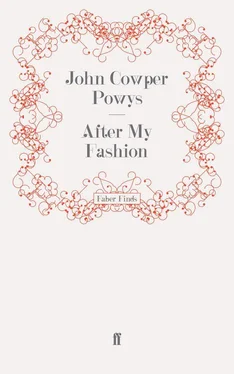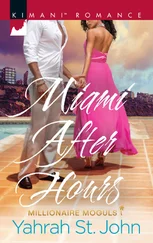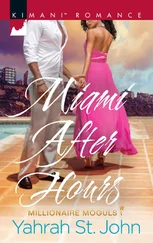‘But Roger dear,’ cried Catharine, ‘the army isn’t an institution.’
‘Is marriage an institution, Catharine?’ asked Karmakoff.
‘Not for you or me,’ the girl replied, giving him a strange quick look.
At that point Roger Lamb arose to his feet. ‘Well! I think I’ll be making my way home,’ he said.
They all made an involuntary movement towards him; and while Richard was searching for his hat and stick they surrounded him awkwardly, in a silence full of unsaid things.
His slim figure and closely cropped skull seemed to grow almost terrifyingly alien from them; seemed to repel them, for all his gentleness, as if with a stern and menacing gesture.
He shook their hands quietly enough when that moment’s embarrassed pause was over; the passionate sympathy of the embrace which Catharine Gordon gave him broke the spell of the general discomfort.
‘You’ll take him home, Richard, won’t you?’ said Nelly, and added a hurried ‘of course he will! No, Roger, he must go with you. You must let him. He’ll see you to bed and then come back to us.’
As Richard walked by the side of the doomed boy, up Varick Street and across Sheridan Square, in front of the Greenwich Village Theater, he became conscious of the extraordinary power of Lamb’s self-possession.
This might well be the last time the youth was destined to walk through those well-known haunts, the last time through an inconceivable eternity; and yet he seemed to look round him with his usual whimsical gravity, noting the passers-by and the various familiar scenes without a sign of dramatic self-consciousness.
They went into one of the innumerable Village cafés for a cup of coffee, and Richard was amazed at the urbanity and aplomb with which his companion greeted some casual acquaintances of his, Dulcie Foster and her strange friend Siegfried Stein, the mad musician. When finally, an hour afterwards, he left the room in Waverley Place where he had seen the young man safely to bed, he felt himself impelled to walk round Washington Square in order to collect his thoughts before returning home.
The night was a little damp and chilly, although the day had been hot. The trees in the square had already changed their tints and many of their leaves had fallen. As he strode beside the familiar arch, whose classic facade is so curiously adorned with two statues of the same Father of the Country, and let his eyes wander up the long perspective of Fifth Avenue, he realized how tremendous was the mere weight of sheer material substantiality in this astounding city. The death of a fragile man-of-letters, the death of many men-of-letters, what were they amid the palpable projections of this tremendous scene?
As he moved up close to the masonry of the arch, to shelter himself from the tornado of whirling automobiles that rolled past him, he visualized this harsh raw emphatic city as a sort of deliberately flung-out challenge to the march of the feet of the destinies. It was like a great flaring advertisement sign, this city, hung up here between the deep sky and the deep ocean, with a sort of defiance to all the old submissions and resignations. These immense marble-and-iron structures, blazing with a million lights, seemed to flaunt in the face of the gods a certain bravura of splendid levity.
The Old World with its time-bleached pieties had accepted those gods’ austere decisions and had bowed low before them in patient fatalistic ritual. But this reckless New World seemed to claim, in daring impious flippancy, the right to deny the whole traditional order, its solemn sorrows as well as its solemn assuagements, and to fling forth a sort of profane adventurous challenge to the whole system of things.
The death of a man, contemplated in the light of the illuminated perspective of Fifth Avenue, dwindled into a kind of negligible accident. So many men must have died in order that this huge shout of defiance should reach the planetary spaces.
Love and friendship and religion and loyalty, these things were proper subjects for the old forms of art; but here in New York these things seemed to fall into the background and other manifestations of the life force seemed to assume prominence.
In a different mood Richard might have been tempted to condemn these other manifestations, as part of the primordial brutality in things, but in some queer way the influence of Roger Lamb had altered his feeling about them. The journalist had thrown out to him so many capricious fancies as he prepared for his last night in his own bed, that Richard began to wonder whether it was possible that this huge chaotic welter of a world might after all be destined to evoke some completely new attitude to life; some attitude in which camaraderie took the place of love, honesty to one’s self the place of loyalty to others, cynical courage replaced submissive piety, as a reckless indifference to death did the old sad resignation.
As he walked slowly back to Charlton Street through the familiar quarter with its voluble crowds and its lighted fruit shops great splashes of crude warm colour against the darkness, there came upon him a dim feeling that there was something here, some mood, some attitude of the spirit, some breaking up of ancient barriers that it would be perhaps unwise wholly to harden one’s heart against.
At any rate he was able in that hour, as he had never been able before, to gather up into some sort of perspective his former life in Paris, his marriage to Nelly, and his love affair with the dancer. I will make this night , he thought, as he passed the illuminated front of the Greenwich Village Theater, a new start for my poem. I will get some of that young fellow’s fancies into it. And I will tell Elise that she was right and I was wrong .
Two days later, after Richard had left for the office, Nelly was called up on the telephone by Catharine Gordon who told her that she and Ivan were at the hospital and that Roger Lamb was dead.
Catharine informed her that Karmakoff was taking her down to Atlantic City to get a breath of sea air, and that she had already spoken to Richard ‘over the phone’.
Nelly got a queer startled sensation from Catharine’s words which had ended with incoherent emotion. She stood for a few minutes by her kitchen tap, fumbling with the breakfast things and mechanically putting into the water some plates which she had already washed. An infinite sadness invaded her heart. It seemed incredible that this self-possessed boy, who had talked to them so quietly in that very room only forty-eight hours ago, was now as far divided from her as her own father.
The news about Atlantic City was a shock to her too. She wondered if Karmakoff and Catharine had secretly got married. If not — was this naïve passionate creature self-possessed enough to risk the sort of transient affair which such an excursion suggested?
Nelly had come to feel a maternal tenderness for the erratic young girl; and though Ivan was no pleasure hunter, she could hardly imagine him committing himself to any lifelong attachment.
She did not go so far as to accuse Karmakoff of exploiting the girl’s emotional agitation over Lamb’s death to his own amorous advantage; but she wished Catharine had come straight to her from the hospital instead of going off like this.
But perhaps it was only for the day. There were plenty of late trains back from the famous resort and, after all, it was likely enough, in the easy moral atmosphere in which they lived, that all the harm that could happen had happened already.
She turned with a heart full of vague forebodings to her housework in the little apartment. She could not quite explain to herself the sort of melancholy which descended upon her. It seemed something more than the boy’s death, more than Richard’s unfaithfulness, more than Catharine’s danger, more than her natural apprehensions about her own future. She reverted to each one of these matters, trying to get at the secret of what she felt, but it escaped her each time. It seemed to be something impersonal, a sort of universal misery in things, a kind of freemasonry of tragedy into which, by the medium of her own distress, she had been formally admitted. Whatever it was, it seemed to grow upon her as the morning went on, gathering in intensity and volume, as if actual vibrations of misery were rolling, wave after wave, over her brain. She had felt something like this once before, during the war; but she had got rid of that by digging frantically in her father’s garden. Here, in a New York apartment, there was no garden to dig in. It was about half-past eleven. She was already vaguely beginning to wonder whether she had the spirit to cook herself any lunch when the telephone rang. Lifting the receiver she was surprised to hear her husband’s voice.
Читать дальше











